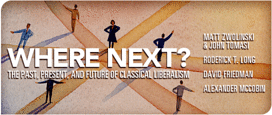Lead Essay
Matt Zwolinski and John Tomasi propose to refocus the libertarian movement. Although they agree that individual property rights are important, they propose to return libertarianism to its nineteenth-century intellectual roots. They argue that the classical liberals valued property rights for different reasons, perhaps, than we in the movement value them now: Property rights were intended to protect the least well-off workers in society. A “neoclassical liberal” would not advocate a welfare state, but would certainly value social justice; his means of attaining it would be through the institutions of property and contract.
Response Essays
Roderick T. Long criticizes the sharp distinctions drawn by Zwolinski and Tomasi between nineteenth-century classical liberals and the “Unholy Trinity” of Mises, Rand, and Rothbard. He suggests many areas in which the earlier thinkers were not as Zwolinski and Tomasi characterize them, as well as several where Mises, Rand, and Rothbard don’t conform either. Long stresses the importance of class analysis in the thought of nineteenth-century classical liberals and points to its resurrection as a key aspect of Rothbard’s thought in particular. This, he suggests, points the way toward a “bleeding-heart absolutism” – an ideology critical of every form of state power, yet also prioritizing the moral claims of the poorest in society.
David Friedman argues that the pre-twentieth century classical liberals were motivated not by a concern for the poor per se, but by utilitarian reasoning. The “working poor” were a large majority of society in their time, and authors like Adam Smith must be read in their historical context. Doing so reveals Smith to be a progenitor of Jeremy Bentham, not John Rawls. Utilitarianism brings problems of its own, of course, but it should not be confused with social justice.
Alexander McCobin argues that libertarians often engage in unproductive debates about who or what is “more” libertarian. One thing lost in these debates is that, across the wide sweep of intellectual history, significant libertarian figures have usually felt free to draw from a wide array of justifications and policy approaches. Each was a product of a particular historical era, and there is no reason to find fault with any of them simply on that account. To advance liberty, we should think and write about libertarian principles in terms that unbiased observers will find persuasive today.

